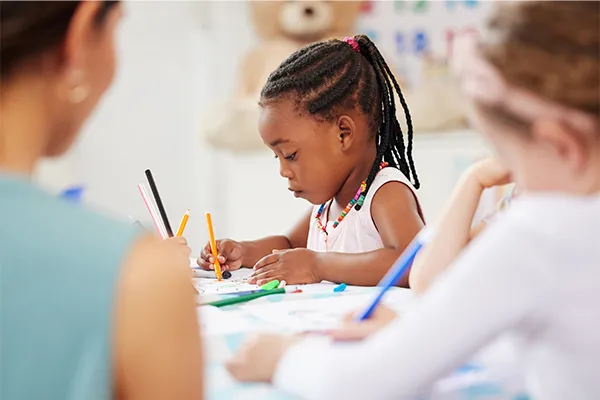What Are Developmental Milestones?
Physical and behavioral skills children develop as they grow from birth to age 5.
- 4 min read
- child development
- health & wellness

While every child learns at a unique pace, research by the American Academy of Pediatrics (AAP) shows that there are common stages of growth in their first five years of life. Developmental milestones are physical and behavioral skill sets children should reach at certain ages. By learning and looking for these skills as your kids grow, you can be better prepared as a parent to ensure they reach each stage and know how to respond to potential delays.
How do developmental milestones work?
The “Learn the Signs. Act Early.” program from the U.S. Centers for Disease Control and Prevention (CDC) defines a developmental milestone as a behavior that at least 75% of children can do by a certain age. Most health organizations space out milestones every two to six months from birth to age 5. While they don’t replace professional screenings, milestones can help you better understand your child’s growth and know what to share with their pediatrician.
Both the AAP and CDC put milestones in these four main categories:
- Social and emotional
- Language and communication
- Cognitive
- Physical and motor
What are the main developmental milestones?
Children change rapidly in their first five years, with significant changes occurring in the first year, so tracking what skills pop up at different stages is challenging but critical. Milestones are a helpful guide for referencing healthy development, especially if your child misses one or more. Here are 5 examples of behaviors the AAP and CDC outline for the various developmental milestones your child should reach at different ages.
2 months
- Smiling when you talk to or smile at them
- Holding up their head during tummy time
- Making sounds other than crying
- Looking at toys for several seconds
- Moving both of their arms and legs
4 months
- Chuckling when you try to make them laugh
- Cooing and turning their head toward your voice
- Holding their head steady without support
- Bringing their hands to their mouth
- Pushing up onto their elbows or forearms
6 months
- Looking at their reflection in mirrors
- Squealing and blowing raspberries
- Reaching for toys they want to play with
- Putting things in their mouth to explore them
- Rolling from their tummy to their back

9 months
- Being shy, fearful, or clingy around strangers
- Looking at you when you call their name
- Making babbling noises like “babababa”
- Lifting their arms to be picked up by you
- Moving things from one hand to the other
12 months
- Playing games like peek-a-boo or pat-a-cake
- Calling their parents “mama” or “dada”
- Putting toys and other things into containers
- Looking for things they see you hide
- Walking while holding onto furniture
15 months
- Copying other children while playing
- Clapping when they feel excited
- Taking a few steps without support
- Trying to say one or two words besides “mama” or “dada”
- Following directions with gestures and words
18 months
- Pointing to show you something interesting
- Helping you dress them by moving their arms or legs
- Following one-step directions with just words
- Saying three or more words besides “mama” or “dada”
- Walking without any support
24 months
- Noticing when others are hurt or upset
- Saying at least two words together like “more snacks”
- Using more gestures than waving and pointing
- Trying to use switches, knobs, or buttons on toys
- Walking up a few stairs with or without help
30 months
- Playing next to or with other children
- Using objects or toys to play pretend
- Showing they know at least one color
- Using their hands to twist doorknobs or lids
- Jumping off the ground with both feet

3 years
- Calming down within 10 minutes after daycare drop-off
- Asking “who”, “what”, “when”, or “why” questions
- Saying their first name when they’re asked to
- Drawing a circle when shown how to do it
- Stringing items like beads or macaroni together
4 years
- Playing pretend as something or someone else
- Comforting others who are sad or hurt
- Talking about at least one thing they did each day
- Saying sentences using four or more words
- Naming a few colors of different items
5 years
- Taking turns or following rules when playing with other kids
- Doing simple chores like clearing the table after eating
- Telling stories with at least two separate events
- Paying attention to activities for 5 to 10 minutes
- Recognizing or using simple rhymes like “bat-cat”
Should I track developmental milestones?
The AAP and CDC recommend that children are screened for general development by their pediatricians at 9, 18, or 30 months. Still, it’s essential to keep them in mind as your kid grows. Developmental milestones are researched and updated to help you be more informed and advocate for your children’s health and well-being. The CDC also offers tools for tracking milestones and other resources to make it easier for you to stay on top of your child’s development.
What can I do if my child misses a milestone?
Before you get concerned about a missed milestone being a bad sign, it’s important to remember that up to 25% of children may not do those things at those ages. While it could be an early sign of autism or other developmental delays, a missed milestone can only be confirmed as a delay indicator by a pediatrician. If your child misses a milestone, don’t hesitate to contact their doctor and share your concerns.
Developmental milestones are a major factor in your child’s early years, and tracking them can be even more challenging if you share custody with your co-parent. If you want help making sure you’re both on the same page between homes, TalkingParents can help. With comprehensive features to help you track your kid’s progress, share appointments, and reference typical milestones in a single app, you and your ex can work together to promote your child’s best interests.